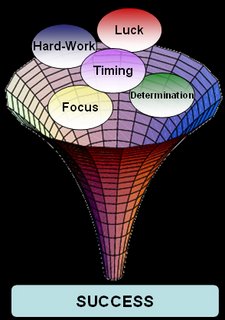 Focus:
Focus: Find a subject that interests you, focus in on it and then figure out how to position yourself accordingly, in order to step into that field. Those who have focus, do not waste precious time on subject matter that is not relevant. My tip here is to do your homework by researching different job positions, qualifications and responsibilities to get a strong handle on relevancy to what you want to accomplish. If you are passionate about creating custom graphics, then maybe try your hand at advertising. Focus is what will help drive you!
Luck: To me luck is a "wild card" because fortune may change all other successful inputs accordingly. You could have the most determination in the world, focus on your goals and work hard, but if your company acquired, then you might lose out. Luck is something that cannot be changed or manipulated, but if you are lucky, the doors may open to new opportunities.
Hard-work: If you work hard, it shows in the quality of the end deliverable. Working hard is a characteristic of any successful entrepreneur. If you are not willing to work hard, then it is actually considered an impediment to your success and a competitive disadvantage. If you aren't working hard, others will be working hard, so they will climb the corporate hierarchy while you remain stationary. Remember you "get out of life what you put in."
Determination: Determination is the driver to make someone work hard and the force is very strong. If you are determined, you will not let any obstacle force you to quit and in doing so, you will be successful. On the downside, this attribute may make you go crazy, which is certainly not healthy to your lives. Find something inside you where you can get this characteristic and "ignite it."
Timing: Timing correlates almost directly with luck, in that if you have superior timing, the right positions or opportunities will clear and allow you to seize them. The difference between timing and luck is that you have the inborn ability to control timing. I say this because you can get your work out to your boss at the right time and manipulate the system.
I hope you all enjoyed this post....leave a comment if something is unclear!
NOTE: I create all the graphics used in the blog if you were wondering
 "Leverage" is a popular vocabulary word in the corporate world. Why is this? Because it is strategic and allows a single person to utilize all the resources around him or her most effectively and efficiently in order to have a positive impact on the bottom line.
"Leverage" is a popular vocabulary word in the corporate world. Why is this? Because it is strategic and allows a single person to utilize all the resources around him or her most effectively and efficiently in order to have a positive impact on the bottom line.





